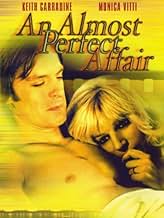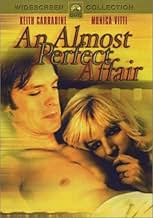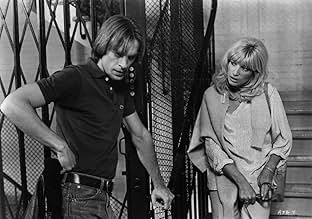अपनी भाषा में प्लॉट जोड़ेंA smalltime US filmmaker goes to Cannes to try to get his movie in the limelight. A wife of one of the producers there gets interested in his story and they begin an affair.A smalltime US filmmaker goes to Cannes to try to get his movie in the limelight. A wife of one of the producers there gets interested in his story and they begin an affair.A smalltime US filmmaker goes to Cannes to try to get his movie in the limelight. A wife of one of the producers there gets interested in his story and they begin an affair.
Rona Barrett
- Rona Barrett on Filmfestival in Cannes
- (बिना क्रेडिट के)
Roger Ebert
- Roger Ebert
- (बिना क्रेडिट के)
Farrah Fawcett
- Farrah Fawcett
- (बिना क्रेडिट के)
Marco Ferreri
- Marco Ferreri on Filmfestival in Cannes
- (बिना क्रेडिट के)
कहानी
क्या आपको पता है
- ट्रिवियाScreenwriters Don Petersen and Walter Bernstein started to develop the characters of Hal Raymond and Maria Barone, who were cast with actor Keith Carradine and actress Monica Vitti respectively, after the latter had been cast as the female lead. The screenwriters developed the characters based on the personalities of the two stars.
- गूफ़Was shot under the name of "Cannes Game"
- भाव
Federico 'Freddie' Barone: When the producer and director fight each other, the loser is always the picture.
- क्रेज़ी क्रेडिटMiss Vitti dressed by Valentino Mr. Valone's wardrobe by Gucci Mr. Carradine's wardrobe IS HIS OWN
- कनेक्शनReferences Casablanca (1942)
- साउंडट्रैकAn Almost Perfect Affair (Main Title)
Written and Performed by Georges Delerue Et Son Orchestre
फीचर्ड रिव्यू
I worked on An Almost Perfect Affair as a sound editor, and although I don't consider it a "bomb", I have to agree with the majority comments about this film that (1) it really isn't a very satsifying film as is, and (2) the subplot promises to be more interesting...if only it had been better developed.
Well, more complete subplots were shot and were a larger part of the first fine cut of this film, contributing much humor and warmth to the truly charming little story that was originally intended.
Actually, there were a couple of subplots:
(1) The Dick Williams character scheming on the promotion of his own exploitation films which only existed as titles and PR T-shirts, and then switching gears to exploit the novice American filmmaker's (Keith Carradine) own modest first feature film effort, which has temporarily been impounded by French customs red tape. (The hassel with customs was supposedly inspired by George Lucas' novice experiences with French customs when he took his first independent feature, "THX", to the Canne Film Festival.)
(2) Then there was Raf Vallone's character story line of the commercial film producer who is fearfully in competition at Canne for the first time with an "artistic" film which he prizes highly. Momentarily ignoring his comely younger wife (Monica Vitti) he instead worries obsessively about the possible negative reactions of a powerful American film critic who is also at the festival, going through elaborate maneuvers to hide from her.
(3) Related to this are the follies caused by his loving but incompetent son (Christian De Sica) as he tries to favorably ingratiate his father's film to the feared critic, only causing her to have a series of increasingly inconvenient and for us hilarious bodily injuries. (The critic character was, I think, loosely based on critic Pauline Kael.) In the original fine cut, the son gratifyingly comes of age when he covers for Monica's ill-advised fling with Carradine, a new maturity on his part which saves the marriage she really doesn't want to give up.
These subplots, juxtaposed against the delightful romantic fling that Monica...feeling under-appreciated by her husband...enters into with innocent Keith as he waits for the release of his impounded film print... these plot points were all integrated parts of the film that we in the post-production crew loved.
But, as sometimes happens, some unfortunate decisions evolved to change things during post-production.
After previewing the fine cut with the temp sound mix, someone close to director Michael Ritchie advised him to "...recut it for love...", basically meaning less screen time for the subplots and wonderful character performances that fleshed-out the story.
There may have been additional pressures and/or considerations that the post production crew was not privy to, but the unfortunate result was that we grudgingly (in my case, anyway) had to omit much of the subplot material, which reduced much of the original charm and humor of this film. The love story part of it, while perfectly fine, was never scripted or shot to be the structural spine of the film, and the subsequent re-cut pulled the life out it as well.
There may also have been budget considerations. I think that this independent film was financed on a "negative pickup" deal, part of which means that a finite amount of budget monies are secured for the production company from an investor or investment group, but any fiscal overages are contractually assumed directly by the production company. I remember hearing some talk about shortening the film to save possible post-production overruns. I don't know how much this figured into the decision to recut.
Whatever the reasons, the result was that a potentially humorous and charming little gem of a film lost it's life, it's audience, and any hope of recouping a decent profit. Ah, if film lovers only know how often this kind of thing happens to hundreds of otherwise good films that have died aborning, there could well be continual sobbing and screams from the loges for years to come.
And yet, as long as I knew and worked with Michael, he always had great affection for this film. Perhaps he was remembering the film he had originally shot, the sweet little film that only a few of us saw, the film that existed for only a brief, secular moment in the cutting room.
As films go, this is one of the good ones that got lost...and it's really a shame.
Well, more complete subplots were shot and were a larger part of the first fine cut of this film, contributing much humor and warmth to the truly charming little story that was originally intended.
Actually, there were a couple of subplots:
(1) The Dick Williams character scheming on the promotion of his own exploitation films which only existed as titles and PR T-shirts, and then switching gears to exploit the novice American filmmaker's (Keith Carradine) own modest first feature film effort, which has temporarily been impounded by French customs red tape. (The hassel with customs was supposedly inspired by George Lucas' novice experiences with French customs when he took his first independent feature, "THX", to the Canne Film Festival.)
(2) Then there was Raf Vallone's character story line of the commercial film producer who is fearfully in competition at Canne for the first time with an "artistic" film which he prizes highly. Momentarily ignoring his comely younger wife (Monica Vitti) he instead worries obsessively about the possible negative reactions of a powerful American film critic who is also at the festival, going through elaborate maneuvers to hide from her.
(3) Related to this are the follies caused by his loving but incompetent son (Christian De Sica) as he tries to favorably ingratiate his father's film to the feared critic, only causing her to have a series of increasingly inconvenient and for us hilarious bodily injuries. (The critic character was, I think, loosely based on critic Pauline Kael.) In the original fine cut, the son gratifyingly comes of age when he covers for Monica's ill-advised fling with Carradine, a new maturity on his part which saves the marriage she really doesn't want to give up.
These subplots, juxtaposed against the delightful romantic fling that Monica...feeling under-appreciated by her husband...enters into with innocent Keith as he waits for the release of his impounded film print... these plot points were all integrated parts of the film that we in the post-production crew loved.
But, as sometimes happens, some unfortunate decisions evolved to change things during post-production.
After previewing the fine cut with the temp sound mix, someone close to director Michael Ritchie advised him to "...recut it for love...", basically meaning less screen time for the subplots and wonderful character performances that fleshed-out the story.
There may have been additional pressures and/or considerations that the post production crew was not privy to, but the unfortunate result was that we grudgingly (in my case, anyway) had to omit much of the subplot material, which reduced much of the original charm and humor of this film. The love story part of it, while perfectly fine, was never scripted or shot to be the structural spine of the film, and the subsequent re-cut pulled the life out it as well.
There may also have been budget considerations. I think that this independent film was financed on a "negative pickup" deal, part of which means that a finite amount of budget monies are secured for the production company from an investor or investment group, but any fiscal overages are contractually assumed directly by the production company. I remember hearing some talk about shortening the film to save possible post-production overruns. I don't know how much this figured into the decision to recut.
Whatever the reasons, the result was that a potentially humorous and charming little gem of a film lost it's life, it's audience, and any hope of recouping a decent profit. Ah, if film lovers only know how often this kind of thing happens to hundreds of otherwise good films that have died aborning, there could well be continual sobbing and screams from the loges for years to come.
And yet, as long as I knew and worked with Michael, he always had great affection for this film. Perhaps he was remembering the film he had originally shot, the sweet little film that only a few of us saw, the film that existed for only a brief, secular moment in the cutting room.
As films go, this is one of the good ones that got lost...and it's really a shame.
टॉप पसंद
रेटिंग देने के लिए साइन-इन करें और वैयक्तिकृत सुझावों के लिए वॉचलिस्ट करें
- How long is An Almost Perfect Affair?Alexa द्वारा संचालित
विवरण
बॉक्स ऑफ़िस
- US और कनाडा में सकल
- $85,493
- दुनिया भर में सकल
- $85,493
इस पेज में योगदान दें
किसी बदलाव का सुझाव दें या अनुपलब्ध कॉन्टेंट जोड़ें

टॉप गैप
By what name was An Almost Perfect Affair (1979) officially released in Canada in English?
जवाब
































